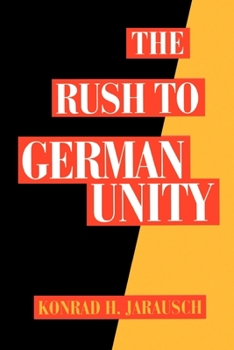The Rush to German Unity
Select Format
Select Condition 
Book Overview
The bringing down of the Berlin Wall is one of the most vivid images and historic events of the late twentieth century. The reunification of Germany has transformed the face of Europe. In one stunning year, two separate states with clashing ideologies, hostile armies, competing economies, and incompatible social systems merged into one. The speed and extent of the reunification was so great that many people are still trying to understand the events. Initial elation has given way to the realities and problems posed in reuniting two such different systems.
The Rush to German Unity presents a clear historical reconstruction of the confusing events. It focuses on the dramatic experiences of the East German people but also explores the decisions of the West German elite. Konrad H. Jarausch draws on the rich sources produced by the collapse of the GDR and on the public debate in the FRG. Beginning with vivid media images, the text probes the background of a problem, traces its treatment and resolution and then reflects on its implications.
Combining an insider's insights with an outsider's detachment, the interpretation balances the celebratory and the catastrophic views. The unification process was democratic, peaceful and negotiated. But the merger was also bureaucratic, capitalistic and one-sided. Popular pressures and political manipulation combined to create a rush to unity that threatened to escape control. The revolution moved from a civic rising to a national movement and ended up as reconstruction from the outside. An ideal source for general readers and students, The Rush to German Unity explores whether solving the old German problem has merely created new difficulties.
The Rush to German Unity presents a clear historical reconstruction of the confusing events. It focuses on the dramatic experiences of the East German people but also explores the decisions of the West German elite. Konrad H. Jarausch draws on the rich sources produced by the collapse of the GDR and on the public debate in the FRG. Beginning with vivid media images, the text probes the background of a problem, traces its treatment and resolution and then reflects on its implications.
Combining an insider's insights with an outsider's detachment, the interpretation balances the celebratory and the catastrophic views. The unification process was democratic, peaceful and negotiated. But the merger was also bureaucratic, capitalistic and one-sided. Popular pressures and political manipulation combined to create a rush to unity that threatened to escape control. The revolution moved from a civic rising to a national movement and ended up as reconstruction from the outside. An ideal source for general readers and students, The Rush to German Unity explores whether solving the old German problem has merely created new difficulties.
Format:Paperback
Language:English
ISBN:0195085779
ISBN13:9780195085778
Release Date:February 1994
Publisher:Oxford University Press
Length:304 Pages
Weight:1.10 lbs.
Dimensions:0.8" x 6.0" x 9.0"
Customer Reviews
1 rating
A good objective review
Published by Thriftbooks.com User , 16 years ago
Mr. Jarausch has writen a detailed and comprehensive look at the latest German revolution and recreation of the German State. Beginning with the first tentative steps of protest to the packed streets of the Wende and the first holes in the Wall, we end the book with an elected and reunited Germany and an honest assessment of its pros and cons. Very helpful here is that Mr. Jarausch eschews triumphalism, which mars the majority of works on German reunity. Whether you're in the pro or anti-reunion camp (and I'm in the latter) you can't fault Mr. Jarausch's thorough examination of causes and events, and deep insights into the motives and character of all parties concerned. I'll spare the reader my opinions as to why I think this unity was a rush job in more ways than one, and for less than noble motives, except to endorse a thorough reading of this book for all those interested in modern Germany and Europe. One criticism to the publisher: it's annoying to change type fonts, especially in the middle of sentences. Printed on a Gutenberg press, perhaps?





